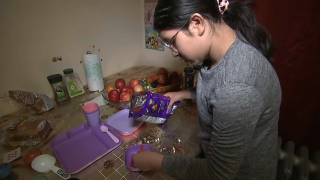
As we come out of the coronavirus pandemic, one Chicago hospital is seeing a surge of children with prediabetes.
“We are working with a truckload, not a few kids, but a truckload of kids with prediabetes,” said Marla Solomon, a diabetes educator with UI Health.
Right now, UI Health is treating 400 Chicago-area children who are diagnosed with prediabetes. There are more cases of children with type two diabetes.
“Our youngest patient here with type two diabetes is an 8-year-old, which is extremely difficult,” said Dr. Claudia Boucher-Berry, a pediatric endocrinologist at UI Health.
Feeling out of the loop? We'll catch you up on the Chicago news you need to know. Sign up for the weekly Chicago Catch-Up newsletter here.
During the pandemic, Boucher-Berry saw weight gains in some children exceed 20 times what’s normal.
“On top of that, their blood sugars were rising. Their blood pressures were rising. We saw an increase in the number of children with high cholesterol,” said Boucher-Berry.
Some of these children are getting help through a Family Lifestyle Intensive Program, also called FLOP, where Solomon teaches children and their families small tweaks in their daily routines.
Local
“The biggest thing is what are you drinking? Are you drinking, you know, a half a cup of juice, which is comparable in sugar to a medium apple, or are we drinking two cups?” Solomon said.
Solomon teaches families they can see a big impact through portion control.
She explains the palm of your hand is roughly the recommended portion of meat and cheese, which is three ounces. A fist is about the size of a cup, which is the portion of pasta, rice and other grains.
Fatima Cruz and her family from Gage Park are enrolled in the FLIP program.
At age 9, Fatima was diagnosed with prediabetes.
“I had too much sugar in my body, which was scary for me,” Fatima said.
“I was concerned, because I don’t know what to do,” said Azuzena Cruz, Fatima’s mom.
After going to weekly classes as part of the FLIP program, Fatima and her mother are now paying closer attention to nutrition labels and using measuring cups and spoons to portion our their meals.
NBC 5 asked Fatima: what is one of the most important things she’s learned?
“No food is bad for you,” Fatima said. “It’s about watching the portions, watching what you eat.”
It’s a key takeaway not just for the children with prediabetes, but their entire family.
“Prediabetes is a precursor to type two diabetes, which tends to run in families,” said Boucher-Berry. “If we educate people on what you can do at home, you don't have to sign up for an expensive gym program. You don't have to buy an expensive meal program. Really, you can make these little changes with what's in your refrigerator.”
Several months into the program, Fatima is already seeing improvement in her blood tests.
“They say that the sugar went down, the numbers, the sugar. And we were like four months on the nutrition already. So I say Fatima, 'This is working for us,'” said Azuzena Cruz.



